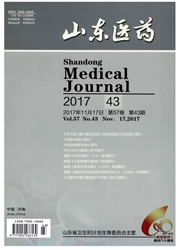

 中文摘要:
中文摘要:
目的探讨阿司匹林(ASP)诱导小鼠脾源性树突状细胞(DCs)产生免疫耐受的机制。方法将16只小鼠随机均分为空白对照组(对照组)、ASP1组、ASP2组、ASP3组[分别腹腔注射ASP0.01、0.02、0.03mg/(kg·d)]各4只。1个月后取各组小鼠脾脏制备脾细胞,观察细胞生长情况,计算脾源性DCs数量,检测脾源性DCs表型变化、脾源性DCs刺激T细胞增殖的能力、DCs培养液中的IL-10、IL-12表达。结果除对照组外,ASP1组、ASP2组、ASP3组大部分细胞有典型树枝样突起;与对照组比较,ASP组脾源性DCs表型33D1表达、DCs培养液中的IL-10表达升高,CD80与CD83表达、T细胞增殖活性、DCs培养液中的IL-12表达降低(P均〈0.05),以ASP3组变化最明显。结论小鼠体内输注ASP后,其脾源性DCs表型33D1表达升高,CD80、CD86。表达降低,刺激T细胞增殖能力减弱,DCs培养液中IL-10升高、IL-12降低。
 英文摘要:
英文摘要:
Objective To research the mechanism of spleen-derived dendritic cells (DCs) in the aspirin infused-mice to induce immunologic tolerance in vivo. Methods Sixteen mice were randomly divided into blank group, ASP1 group, ASP2 group, ASP3 group[ Abdominal infused ASP 0.01, 0.02, 0.03 mg/( kg · d)respectively]. One month after infusion, the spleen cells of mice were taken to observe the cells growth, at the same time the number of spleen-derived DCs were calculated, the differences on spleen-derived DCs phenotype were detected and the capability to stimulate the proliferation of lymphocytes was examined. IL-10 and IL-12 of the culture medium was also measured. Results Compared to the blank group, most cells in ASP1 group, ASP2 group, ASP3 group possessed morphological characters of typical DCs. Ceils in the aspirin group highly expressed 33D1 and lowly expressed CDs0, CD86, induced light lymphocytes proliferation, the increased secretion of IL-10, and the decreased secretion of IL-12 in the culture medium( P 〈0.05 ) , especially the ASP3 group. Conclusion Infused aspirin into the mice in vivo, the spleen-drived DCs in rats highly express 33D1 and lowly express CDs0, CD86, weaken lymphocytes proliferation, increase secretion of IL-10 and decrease secretion of IL-12 in the culture medium.
 同期刊论文项目
同期刊论文项目
 同项目期刊论文
同项目期刊论文
 期刊信息
期刊信息
